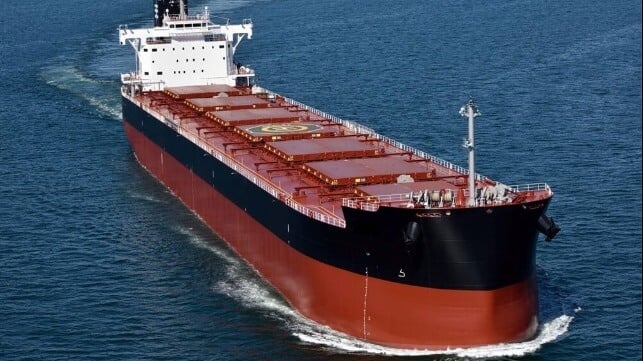Project Outlines Process for Converting Standard Bulk Carrier to Methanol

A new project led by the Maersk Mc-Kinney Møller Center for Zero Carbon Shipping addressed the challenges and processes required to convert one of the largest segments of the current global shipping fleet, the Kamsarmax bulk carrier, for dual-fuel methanol operations. With involvements from leaders across the segments of the industry, the project leaders believe it is a key step in decarbonization that provides critical insights into the feasibility of retrofit projects.
The project, which aimed to assess the techno-economic feasibility of a retrofit from fuel oil to dual-fuel methanol, has been granted an Approval in Principle (AiP) by Japan’s ClassNK, which also contributed regulatory advice and facilitated safety risk assessments.
The Center highlights that Kamsarmax bulk carriers represent a significant share of the existing fleet. It believes that developing a general retrofit package could drive low-emission solutions across the maritime industry. Additionally, the project sheds light on the challenges and opportunities that need to be addressed when deciding to retrofit a bulk carrier.
The retrofit project was based on a standard Kamsarmax design developed by Tsuneishi Shipbuilding which worked along the Center as a lead in the project. They explored the technical and operational challenges and opportunities of converting vessels to dual-fuel methanol. The retrofit design and technological solutions were developed in close cooperation with MAN ES, which provided the main engine and FuelTech expertise on design reviews and HAZID processes (Hazard Identification). Cargill offered operational and technical insights bringing in the charterer’s perspective, while the Danish Maritime Administration participated as an observer.
“With the medium-sized bulk carrier segment representing a substantial share of the industry, this modular retrofit solution paves the way for an accelerated transition to methanol and other sustainable fuels,” said Evangelos Fragkoulis, Head of Ship Design for the Maersk Mc-Kinney Møller Center for Zero Carbon Shipping. “It demonstrates a paradigm shift towards non-intrusive, safe, and agile solutions that enable the integration of green fuels without compromising safety.”
The Kamsarmax is an 80,000 to 84,000 dwt dry bulk carrier which is very popular in the industry with the first vessel of the class delivered in 2005. Tsuneishi alone reports having built over 300 of the vessels, and the number one market share in the category, which generally measure approximately 230 meters (755 feet) in length making it a versatile and economical design. Tsuneishi highlights with a lifespan of 20 to 30 years, it is a critical segment of the industry that will significantly impact maritime decarbonization efforts.
The project generated multiple design solutions, including novel and modular fuel handling onboard, as well as methanol storage and integration options that optimize safety, capacity and ultimately reduce cost and conversion lead times. Additionally, the project has developed general design principles for methanol retrofit aimed at ship designers, shipyards and operators, providing a navigational framework through key design decisions.
The Maersk Mc-Kinney Møller Center for Zero Carbon Shipping reports that it will be releasing a comprehensive case study on the design. The guidelines developed during the project will also be released late this year.
